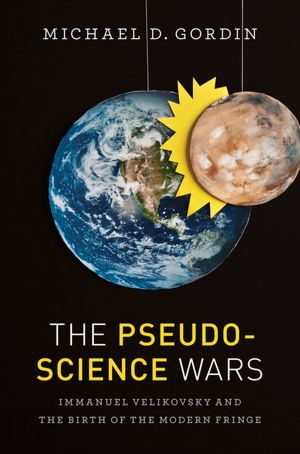 As readers might have surmised, a number of the bloggers at the Duck are into the philosophy and history of science. PTJ has written an exceptional book on the philosophy of science in the context of international-relations scholarship. Others of us dabble, with varying degrees of commitment.
As readers might have surmised, a number of the bloggers at the Duck are into the philosophy and history of science. PTJ has written an exceptional book on the philosophy of science in the context of international-relations scholarship. Others of us dabble, with varying degrees of commitment.
When PTJ and I were working on “Paradigmatic Faults in International-Relations Theory” I was fortunate to be able to talk Kuhn and Lakatos with Michael Gordin of Princeton University. When I was at Harvard there were some people who were scary brilliant. Michael was one of those guys. He was also one of my debate partners.
Michael’s new book, The Pseudoscience Wars: Immanuel Velikovsky and the Birth of the Modern Fringe (University of Chicago, 2012) has been getting a lot of positive buzz.
Indeed, I’m trying to arrange an interview with Michael for New Books in Science Fiction and Fantasy — under the auspices of the “I can do anything I damn want” clause I negotiated with the New Books Network. But in the meantime, check out the eminent Steven Shapin’s review in the London Review of Books. An excerpt:
It was American scientists who went ballistic over Velikovsky, not historians, and one purpose of Michael Gordin’s probing and intelligent The Pseudoscience Wars is to ask why they responded to Velikovsky as they did. Putting that sort of question is a sign of changed times. Passions have cooled; circumstances have altered. Almost all previous books about Velikovsky and the affair have been for or against, celebratory or accusatory, justifying the way the scientific community handled the business or criticising them for handling it badly. There’s no evidence that Gordin considers Velikovsky’s theories anything but nutty, yet affirming and identifying their nuttiness is a non-barking dog here. Gordin is a disengaged and dispassionate historian of science – much of his work has been about Russian science and the science and politics of nuclear weapons in the postwar period – and the questions he poses about Velikovsky are meant to illuminate the condition of American science in ‘the postwar public sphere’ and to figure out what has been meant by the notion of ‘pseudoscience’. The Velikovsky affair was at once a long-running episode of surpassing strangeness and, Gordin says, ‘ground zero’ in a series of Cold War era ‘pseudoscience wars’. Understanding the pathological is here meant to encourage a new perspective on the normal.
The book is really terrific. Go read it.
Daniel H. Nexon is a Professor at Georgetown University, with a joint appointment in the Department of Government and the School of Foreign Service. His academic work focuses on international-relations theory, power politics, empires and hegemony, and international order. He has also written on the relationship between popular culture and world politics.
He has held fellowships at Stanford University's Center for International Security and Cooperation and at the Ohio State University's Mershon Center for International Studies. During 2009-2010 he worked in the U.S. Department of Defense as a Council on Foreign Relations International Affairs Fellow. He was the lead editor of International Studies Quarterly from 2014-2018.
He is the author of The Struggle for Power in Early Modern Europe: Religious Conflict, Dynastic Empires, and International Change (Princeton University Press, 2009), which won the International Security Studies Section (ISSS) Best Book Award for 2010, and co-author of Exit from Hegemony: The Unraveling of the American Global Order (Oxford University Press, 2020). His articles have appeared in a lot of places. He is the founder of the The Duck of Minerva, and also blogs at Lawyers, Guns and Money.


0 Comments